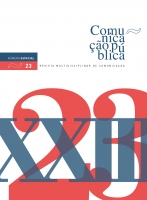For an educational propaganda
the photographic record of Mário Novais regarding a visit of Mocidade Portuguesa Feminina to the Museu Nacional de Arte Antiga
DOI:
https://doi.org/10.4000/cp.1912Keywords:
Mário Novais, museums, photography, magazines, education, propagandaAbstract
The set of photographs captured by Mário Novais during a field trip of the Mocidade Portuguesa Feminina to the Museu Nacional de Arte Antiga integrated the first issue of the magazine of that organization in May 1939, thus reflecting how the photographic medium had become a central instrument in the discourse of power during Estado Novo. The framing of these images in the educative policy fomented by the Salazar regime reflects its formative and ideological goal, through the establishment of the practice of visits to the museums, sustained by a patriotic ideal of revisiting and glorifying a mythic past. This study aims to demonstrate how this propagandistic dimension is constructed through visual strategies, based in the connection between word and image, and claiming the defining aspects of the indexical status of photography itself.
Downloads
References
Barreto, A., Mónica, M. F. (coord.) (1999). Dicionário da História de Portugal, vol. 8. Porto: Figueirinhas.
Barthes, R. (2009). O Óbvio e o Obtuso. Lisboa: Edições 70.
Benjamin, W. (2006). A Modernidade. Lisboa: Assírio & Alvim.
Boletim da Mocidade Portuguesa Feminina (1939). Secretariado Nacional da Propaganda. (1), Maio e (39), Julho.
Carvalho, J. A. S.; Carvalho M. B., (2009). Museus e Exposições: Ideias, Formas e Discursos de Representação e Celebração da Arte Portuguesa (do Liberalismo ao Estado Novo). In Rodrigues, Dalila (dir.). História da Arte Portuguesa. Da Pré-História ao século XX, Vol. 20. Vila Nova de Gaia: Fubu Editores, pp. 91-139.
Frade, P. Miguel (1992). Figuras de Espanto. Fotografia antes da sua Cultura. Lisboa: Edições Asa.
Freund, G. (1989). Fotografia e Sociedade. Lisboa: Vega, D.L.
Medeiros, M. (2008). A fotografia, a modernidade e o seu segredo: Antes e depois de Barthes. Revista de Comunicação e Linguagens, (39): 27-46.
Medeiros, M. (2000). Fotografia e Narcisismo: O Auto-Retrato Contemporâneo. Lisboa: Assírio & Alvim.
Miranda, J. B. (2012). Corpo e Imagem. Lisboa: Veja.
Mocidade Portuguesa Feminina: organização e atividades. Lisboa: Secretariado da Propaganda Nacional. In: http://www.biblartepac.gulbenkian.pt/ipac20/ipac.jsp?session=1K1I4461R7016.16177&profile=ba&source=~!fcgbga&view=subscriptionsummary&uri=full=3100024~!33313~!0&ri=3&aspect=basic_search&menu=search&ipp=20&spp=20&staffonly=&term=Mocidade+Portuguesa+Feminina&index=.GW&uindex=&aspect=basic_search&menu=search&ri=3
Pimentel, I. F. (2001). História das Organizações Femininas do Estado Novo. Lisboa: Temas e Debates.
Rosas, F. (coord.) (2001). Nova História de Portugal (1930-1960). Lisboa: Editorial Estampa.
Rosas, F. (coord.) (1994). História de Portugal. O Estado Novo (1926-1974). Lisboa: Estampa
Sekula, A. (1982). On the invention of Photographic Meaning. In: Burgin, V. ed. Thinking Photography. Palgrave Macmillan.
Serén, M. C. (2009). A Fotografia em Portugal. Arte Portuguesa. Da Pré-História ao Século XX. Vila Nova de Gaia: Fubu Editores.
Sontag, S. (2012). Ensaios Sobre Fotografia. Lisboa: Quetzal Editores.
Strauss, D. L (2003). Between the Eyes: Essays on Photography and Politics. New York: Aperture.
Ilustração
Fig. 1 Boletim da Mocidade Portuguesa Feminina, n. º 1, maio de 1939.
©Hemeroteca Municipal de Lisboa
Downloads
Published
Issue
Section
License
Copyright (c) 2017 Direitos do Autor (c) 2017

This work is licensed under a Creative Commons Attribution-NonCommercial 4.0 International License.
Os conteúdos da Comunicação Pública estão licenciados com uma licença Creative Commons - Atribuição-NãoComercial 4.0 Internacional.


